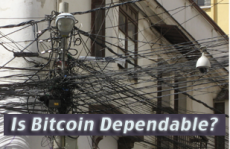Is Bitcoin dependable?

Edward Hadas at Reuters is so sure Bitcoin will collapse that he wrote an early obituary eulogizing the loss of confidence in a baseless cryptocurrency, caused by an illicit and valueless speculation war. Ignoring this death knell includes a long list of Bitcoin investors, each of whom harnesses arbitrage to stabilize the currency. A futures market for Bitcoin already exists and others are on the way. These proponents also point to the world’s first Bitcoin ATM installed in a Vancouver coffee shop in October 2013 and the others springing up since. It would seem the cryptocurrency craze has reinforced usable modularity across the spectrum – from investing to retail banking.
The Bitcoin digital currency, which exists as software, is created by solving complex tasks embedded in a program through a process called mining. Once successfully mined, the currencies can be bought and sold via online exchanges. Websites like startbitcoin.com help novices learn to mine Bitcoins, and the underlying open source code is available at the foundation’s website bitcoin.org, with tutorials to help the uninitiated.
It’s a predicament governments wish would go away. There is real danger that Bitcoin could elude established tax systems while causing huge losses for its investors. Bitcoin is an uninsured investment tool, after all. But cryptocurrency defenders argue that other highly liquid commodities, including foreign currency exchanges, have similar problems. Non-deliverable forwards are prevalent where forward FX trading has been banned by the government, for instance.
Government regulators across the globe are chiming in. The European Banking Authority issued a statement that Bitcoin lacks consumer protection, while Tawain’s Financial Supervisory Commission (FSC) Chairman threatened to “demolish” any presence of it on their soil. Careful not to call the digital currency worthless, the EBA warned consumers to “remain mindful that holding virtual currencies may have tax implications.”
These regulators are basing their fears on a history of destabilizing forces they’ve spent the better part of a century trying to disband. In 1907, the Knickerbocker Crisis caused customers to line up outside their banks to demand their deposits back. The New York Stock Exchange fell nearly 50% from the previous year. Many historians believe unregulated stock betting caused the problems. Some might even say Bitcoin is just another bucket shop, a fly-by-night exchange offering their own prices on a made up commodity.
The 1907 panic would have bankrupted the country if not for the help of J.P. Morgan (the man), who shored up the system with his personal wealth. But Mr. Morgan’s solution was temporary, and it wasn’t until the establishment of the Federal Reserve Act in 1913 that government regulation began buttressing consumer confidence in the US economic system. Over the years the Fed hasn’t always staved off lacking consumer confidence, but many agree there is a federal responsibility responsibility to supervise banking institutions and practices. Unregulated cryptocurrencies represent yet another threat to consumer confidence, they say.
Of course, this is why Bitcoin is so seductive to investors. No federal government seems to have any ability to control its growth or its failure. Nobody can borrow from it and nobody can tax it directly. It’s the first open-source banking portal promising to equalize the playing field for all participants while ensuring no government intervention.

They said the same thing about the Euro! This is the next world currency, Bitcoin…
Also, don’t let Hadas rain on your parade. That guy can’t be optimistic about rainbows.
Will keep that in mind.
I think a great deal of the assumed value of BC, (both now and forcasted) is based on the extra-national quality it brings to “wealth mobility”.
If it can become a proven vehicle for say….the Chinese…I think the numbers we see today are well undervalued.
Having said that- you’ll find precious few of these trinkets stuffed in my virtual mattress.
DB is correct. What you’re providing is a potential tax haven for the rich, or at least a form of currency where once converted from the base currency will allow for mobility and independence from a particular government. Really, it’s just another way to diversify cash holdings rather than hedging FX.
…and really this nuance has been the most surprising thing to me about BC. Why has the Government response been so tepid? You would think that the loss of revenue it’s capable of generating (or preventing…) would have called out the long knives-
http://www.wired.com/wiredenterprise/2014/02/mtgox-2/
That is pretty interesting that thieves withdraw money from Gox and then trick the exchange into thinking they had not received their funds — essentially giving them a way of getting paid more than once. Too bad that bank doesn’t have any … uh, FDIC? for Bitcoins. It’s once bad bank, so I think the overall price will be inconsequential. Nonetheless, makes you wonder if a few of these exchanges experienced the same issue what a run on Bitcoins would do to their overall viability.
this is one of the best website of all time
I am very satisfied of this website and I also rate it daily whenever I do and my whole family is also very agree with this website. I like it so much. i am satisfied.
i am visited this website daily.i liked it.i visit it daily.its stuff is very good.
this is amazing website.